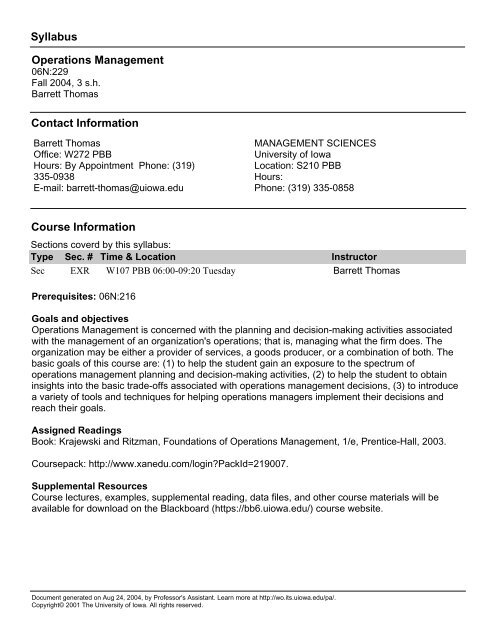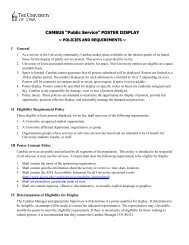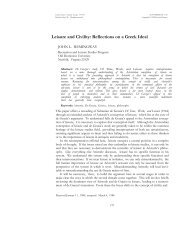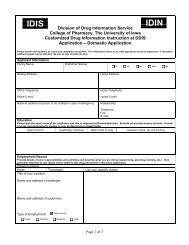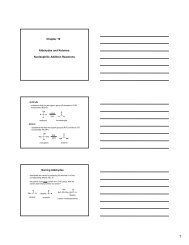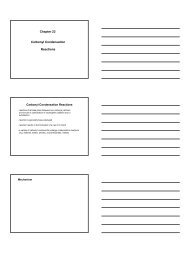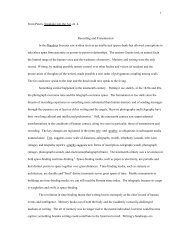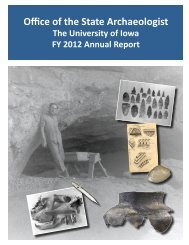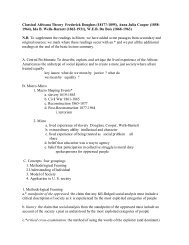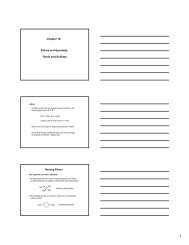Operations Management Syllabus Course ... - University of Iowa
Operations Management Syllabus Course ... - University of Iowa
Operations Management Syllabus Course ... - University of Iowa
Create successful ePaper yourself
Turn your PDF publications into a flip-book with our unique Google optimized e-Paper software.
<strong>Syllabus</strong><br />
<strong>Operations</strong> <strong>Management</strong><br />
06N:229<br />
Fall 2004, 3 s.h.<br />
Barrett Thomas<br />
Contact Information<br />
Barrett Thomas<br />
Office: W272 PBB<br />
Hours: By Appointment Phone: (319)<br />
335-0938<br />
E-mail: barrett-thomas@uiowa.edu<br />
MANAGEMENT SCIENCES<br />
<strong>University</strong> <strong>of</strong> <strong>Iowa</strong><br />
Location: S210 PBB<br />
Hours:<br />
Phone: (319) 335-0858<br />
<strong>Course</strong> Information<br />
Sections coverd by this syllabus:<br />
Type Sec. # Time & Location<br />
Sec EXR W107 PBB 06:00-09:20 Tuesday<br />
Instructor<br />
Barrett Thomas<br />
Prerequisites: 06N:216<br />
Goals and objectives<br />
<strong>Operations</strong> <strong>Management</strong> is concerned with the planning and decision-making activities associated<br />
with the management <strong>of</strong> an organization's operations; that is, managing what the firm does. The<br />
organization may be either a provider <strong>of</strong> services, a goods producer, or a combination <strong>of</strong> both. The<br />
basic goals <strong>of</strong> this course are: (1) to help the student gain an exposure to the spectrum <strong>of</strong><br />
operations management planning and decision-making activities, (2) to help the student to obtain<br />
insights into the basic trade-<strong>of</strong>fs associated with operations management decisions, (3) to introduce<br />
a variety <strong>of</strong> tools and techniques for helping operations managers implement their decisions and<br />
reach their goals.<br />
Assigned Readings<br />
Book: Krajewski and Ritzman, Foundations <strong>of</strong> <strong>Operations</strong> <strong>Management</strong>, 1/e, Prentice-Hall, 2003.<br />
<strong>Course</strong>pack: http://www.xanedu.com/login?PackId=219007.<br />
Supplemental Resources<br />
<strong>Course</strong> lectures, examples, supplemental reading, data files, and other course materials will be<br />
available for download on the Blackboard (https://bb6.uiowa.edu/) course website.<br />
Document generated on Aug 24, 2004, by Pr<strong>of</strong>essor's Assistant. Learn more at http://wo.its.uiowa.edu/pa/.<br />
Copyright© 2001 The <strong>University</strong> <strong>of</strong> <strong>Iowa</strong>. All rights reserved.
<strong>Syllabus</strong>: <strong>Operations</strong> <strong>Management</strong><br />
<strong>Course</strong> Policies<br />
Evaluation <strong>of</strong> Student Performance/<strong>Course</strong> Requirements<br />
The approach to the course includes both lecture and case analysis. The course materials have<br />
been carefully selected to illustrate the basic concepts <strong>of</strong> operations management as they apply to<br />
a variety <strong>of</strong> organizations. Please note that the assigned readings should be completed before the<br />
class.<br />
Furthermore, because these readings may be quite useful in formulating recommendations, they<br />
should precede case analysis whenever applicable.Since the course makes extensive use <strong>of</strong> cases,<br />
the discussion between you and your classmates will form a major source <strong>of</strong> concepts. Thus, class<br />
participation is an important element in the learning process. All students are expected to be<br />
prepared to participate in the discussion. Note that attendance is necessary for participation, but<br />
does not substitute for active participation. Questions are encouraged at any time.<br />
Case Analysis<br />
Students are required to analyze cases in groups <strong>of</strong> size 3 to 5. In most instances, a set <strong>of</strong> case<br />
questions will be supplied for each case used in the course. Case reports will be prepared for<br />
Natural Blends, Excel Logistics, and the Hewlett Packard cases. Case reports should be prepared<br />
in accordance with the format provided below. Due dates are provided in the schedule below.<br />
Case Reports<br />
Each case report will be typed and no more than 5 pages in length excluding attachments. Case<br />
reports must be turned in before the start <strong>of</strong> the class in which the case is discussed. No case<br />
report will be accepted after the class in which the assignment is due is completed. Each report<br />
should answer the assigned case questions. The answers to these case questions should be<br />
integrated into the summary and not treated as a list <strong>of</strong> answers as one would do with a homework<br />
set. Additional guidelines will be given when the first executive summary is assigned.<br />
In preparing the case report, make sure that you clearly address what the problem is that you are<br />
solving. However, you can assume that the reader is familiar with case details, and consequently,<br />
you do not need to explain who the company is, where they are located, etc. Your case report must<br />
contain a detailed analysis <strong>of</strong> the problem, and most importantly, your recommendations must be<br />
supported by this analysis. Feel free to make logical or supportable assumptions. If the assumption<br />
seems to have a significant impact on your recommendation, consider what would happen if that<br />
assumption was not true.<br />
In your case report, refrain from "consultant speak." For example, avoid statements such as,<br />
"Company X should use better forecasting." In fact, every company can use better forecasting. If<br />
you want to recommend better forecasting, demonstrate how to do the better forecasting (e.g. what<br />
model should be used, what data, and then perform the analysis). Essentially, avoid the mistake <strong>of</strong><br />
saying what should be done and then not doing what should be done. As another example,<br />
consider the recommendation, "Company X should implement a continuous review inventory<br />
system in order to reduce inventory." If you make this recommendation, make sure that, in your<br />
Document generated on Aug 24, 2004, by Pr<strong>of</strong>essor's Assistant. Learn more at http://wo.its.uiowa.edu/pa/.<br />
Copyright© 2001 The <strong>University</strong> <strong>of</strong> <strong>Iowa</strong>. All rights reserved.
<strong>Syllabus</strong>: <strong>Operations</strong> <strong>Management</strong><br />
analysis, you have compared the performance <strong>of</strong> a continuous review inventory system with<br />
Company X's current system and have demonstrated the improved performance. Additionally, make<br />
sure that you reference the analysis in making your recommendations.<br />
Finally, case reports will be graded both on the response to the provided questions, the<br />
persuasiveness <strong>of</strong> your arguments, and the style and clarity <strong>of</strong> the writing.<br />
Homework<br />
Homework will be assigned as the semester progresses. You are encouraged to do homework in<br />
groups to help understand the concepts from class, but homework assignments will not be graded.<br />
Exams<br />
There will be two in-class quizzes during the course. I also reserve the right to add a take-home<br />
portion to any quiz. These quizzes are open book and open notes. However, you are expected to<br />
complete the quizzes entirely on your own without the aid <strong>of</strong> input or discussion from other people.<br />
The academic integrity policy, as dictated below, will be strictly enforced.<br />
Grading<br />
Each student's final grade will be based on the following items:<br />
In-class quizzes 50%,<br />
Case Reports 45%,<br />
Participation 5%.<br />
Assignment <strong>of</strong> final grades will be done based on the student's rank within the class and the<br />
occurrence <strong>of</strong> natural "breaks" in the overall rankings. Tippie School <strong>of</strong> <strong>Management</strong> guidelines<br />
suggest that an appropriate grade distribution would include less than 50% A's, greater than 50%<br />
B's, and all other grades at the instructor's discretion. Please note that these guidelines do not<br />
exclude the possibility <strong>of</strong> grades lower than a B.<br />
If there are disputes with the grading <strong>of</strong> any assignments, each student has exactly 1 week from<br />
when the assignment is returned to the class to return the assignment to the instructor with a cover<br />
sheet indicating the specific question and issue <strong>of</strong> concern. Grades can be raised, lowered, or not<br />
altered as a result.<br />
Policy on Make-up Exams<br />
All case reports are "take-home" assignments and will due at least one week from the date<br />
assigned. Consequently, no late assignments will be accepted, and no "make-up" assignments will<br />
be allowed. In the case <strong>of</strong> in-class quizzes, I realize that you may be required to miss a class as the<br />
result <strong>of</strong> work-related travel. In this travel causes you to miss a quiz, please contact me before hand<br />
in order to reschedule the quiz. No other excuse for a missed quiz will be considered.<br />
Attendance Policy<br />
Since students in this class are, in general, both working full-time jobs and taking the class, it is<br />
reasonable that work related activities (notably travel) may require you to miss a scheduled class.<br />
Document generated on Aug 24, 2004, by Pr<strong>of</strong>essor's Assistant. Learn more at http://wo.its.uiowa.edu/pa/.<br />
Copyright© 2001 The <strong>University</strong> <strong>of</strong> <strong>Iowa</strong>. All rights reserved.
<strong>Syllabus</strong>: <strong>Operations</strong> <strong>Management</strong><br />
However, because classroom learning is an important component <strong>of</strong> this MBA course, missing<br />
more than two classes would be detrimental to your class experience. If you are currently<br />
scheduled to miss more than two scheduled classes, consider re-arranging your schedule or<br />
dropping the course. All known religious holidays will be accommodated. If you observe a holiday<br />
that needs accommodation, please see me early in the semester so that we can take the<br />
appropriate steps to handle the conflict.<br />
Plagiarism Policy<br />
Because I regard this class as I would any job responsibility, it seems prudent to clarify in advance<br />
the policy on academic integrity. Given the pr<strong>of</strong>essional nature <strong>of</strong> the MBA program, it is unlikely<br />
that a student in this class would turn in work which is not his or her own. However, if I determine<br />
that any assignment, project, paper or test was not written solely by the student(s) whose name(s)<br />
appears on the project, or material taken from other sources is not appropriately cited, the<br />
student(s) involved will not pass this course and may be subject to program-level discipline.<br />
Decisions on these matters may be appealed to the MBA Committee. The <strong>University</strong> <strong>of</strong> <strong>Iowa</strong> MBA<br />
Honor Code, as well as the definition <strong>of</strong> academic misconduct, can be found in the Tippie school <strong>of</strong><br />
<strong>Management</strong> Student Policies and Procedures Manual.<br />
Accomodation <strong>of</strong> Students with Disabilities<br />
If you have a disability that may require some modification <strong>of</strong> seating, testing, or any other class<br />
requirement, please let me know as soon as possible so that appropriate arrangements can be<br />
made. Similarly if you have any emergency medical information, or if you need special<br />
arrangements in the event the building must be evacuated, please let me know. As a reminder, the<br />
Office <strong>of</strong> Student Disability Services is also available to assist you. This <strong>of</strong>fice is located on the <strong>Iowa</strong><br />
City campus at 3100 Burge Hall, and can be reached at 319-335-1462. Further information is<br />
available at http://www.uiowa.edu/~sds.<br />
Document generated on Aug 24, 2004, by Pr<strong>of</strong>essor's Assistant. Learn more at http://wo.its.uiowa.edu/pa/.<br />
Copyright© 2001 The <strong>University</strong> <strong>of</strong> <strong>Iowa</strong>. All rights reserved.
<strong>Syllabus</strong>: <strong>Operations</strong> <strong>Management</strong><br />
<strong>Course</strong> Timeline<br />
Day<br />
Topic<br />
08/24/04 Lecture 1:<br />
Introduction to<br />
<strong>Operations</strong><br />
<strong>Management</strong>,<br />
Process<br />
<strong>Management</strong><br />
08/31/04 Lecture 2: Capacity<br />
Planning<br />
09/07/04 Lecture 3:<br />
Simulation; Waiting<br />
Lines<br />
09/14/04 Lecture 4: Statistical<br />
Process Control<br />
09/21/04 Lecture 5: Location<br />
09/28/04 Lecture 6: Quiz 1<br />
in-class; Lean<br />
10/05/04 Lecture 7: Project<br />
<strong>Management</strong>;<br />
Forecasting<br />
10/12/04 Lecture 8: Inventory<br />
<strong>Management</strong><br />
10/19/04 Lecture 9:<br />
Newsvendor Models<br />
10/26/04 Lecture 10: Beer<br />
Game<br />
11/02/04 Lecture 11: Supply<br />
Chain <strong>Management</strong><br />
11/09/04 Lecture 12: <strong>Course</strong><br />
Wrap-up<br />
Event<br />
KR: p. 1 - 25, 35 - 45; DL: "What is the Right Supply Chain for<br />
Your Product?", "Deep Change"<br />
KR: 156 - 170, 181 - 189; CP: Benihana <strong>of</strong> Tokyo; DL: "Cabinet<br />
Decisions: . . ."<br />
CP: Natural Blends; DUE: Natural Blends Case Report<br />
KR: p. 126 - 138; CP: Manzana Insurance; DL: "Running a<br />
Hospital Like a Factory, in a Good Way"<br />
KR: p. 204 - 223; CP: Hank Kolb; Excel Logistics DL: "Where's<br />
the Beef? . . ."; DUE: Excel Logistics Case Report<br />
KR: p. 435 - 453; DL: "Decoding the DNA <strong>of</strong> the Toyota<br />
Production System"; "Bumpy Road: . . ."<br />
KR: p. 62 - 77, 288 - 311; CP: Enterprise Resource Planning:<br />
Technology Note; DL: "Rocket Science Retailing is Almost Here -<br />
Are You Ready?"<br />
KR: p. 324 - 347; DL: Gantt-Chart Wedding<br />
KR: p. 88 - 97, 101 - 104; DL:The Newsvendor Model;<br />
"Newsvendors Tackle the Newsvendor Problem"; CP: Webvan<br />
DL: "The Bullwhip Effect in Supply Chains"<br />
KR: p. 258 - 282; CP: Hewlett-Packard Co. : Deskjet Printer (A),<br />
Hewlett-Packard Co. : Deskjet Printer (B); DUE: Hewlett-Packard<br />
Executive Summary; DL: "Three Countries, One Dishwasher";<br />
"Style and Substance: Tiger's New Threads"<br />
Quiz 2 in-class


